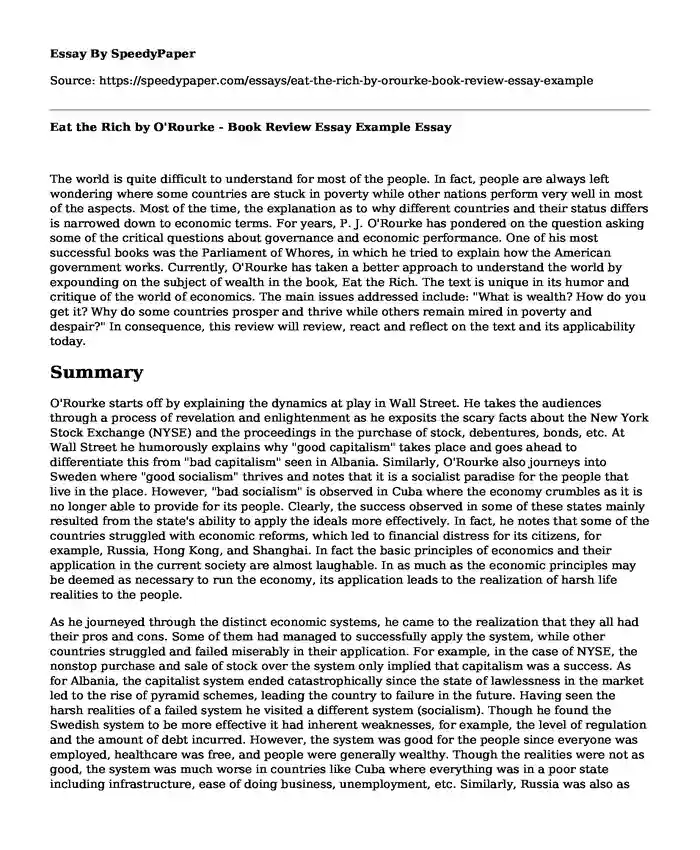The world is quite difficult to understand for most of the people. In fact, people are always left wondering where some countries are stuck in poverty while other nations perform very well in most of the aspects. Most of the time, the explanation as to why different countries and their status differs is narrowed down to economic terms. For years, P. J. O'Rourke has pondered on the question asking some of the critical questions about governance and economic performance. One of his most successful books was the Parliament of Whores, in which he tried to explain how the American government works. Currently, O'Rourke has taken a better approach to understand the world by expounding on the subject of wealth in the book, Eat the Rich. The text is unique in its humor and critique of the world of economics. The main issues addressed include: "What is wealth? How do you get it? Why do some countries prosper and thrive while others remain mired in poverty and despair?" In consequence, this review will review, react and reflect on the text and its applicability today.
Summary
O'Rourke starts off by explaining the dynamics at play in Wall Street. He takes the audiences through a process of revelation and enlightenment as he exposits the scary facts about the New York Stock Exchange (NYSE) and the proceedings in the purchase of stock, debentures, bonds, etc. At Wall Street he humorously explains why "good capitalism" takes place and goes ahead to differentiate this from "bad capitalism" seen in Albania. Similarly, O'Rourke also journeys into Sweden where "good socialism" thrives and notes that it is a socialist paradise for the people that live in the place. However, "bad socialism" is observed in Cuba where the economy crumbles as it is no longer able to provide for its people. Clearly, the success observed in some of these states mainly resulted from the state's ability to apply the ideals more effectively. In fact, he notes that some of the countries struggled with economic reforms, which led to financial distress for its citizens, for example, Russia, Hong Kong, and Shanghai. In fact the basic principles of economics and their application in the current society are almost laughable. In as much as the economic principles may be deemed as necessary to run the economy, its application leads to the realization of harsh life realities to the people.
As he journeyed through the distinct economic systems, he came to the realization that they all had their pros and cons. Some of them had managed to successfully apply the system, while other countries struggled and failed miserably in their application. For example, in the case of NYSE, the nonstop purchase and sale of stock over the system only implied that capitalism was a success. As for Albania, the capitalist system ended catastrophically since the state of lawlessness in the market led to the rise of pyramid schemes, leading the country to failure in the future. Having seen the harsh realities of a failed system he visited a different system (socialism). Though he found the Swedish system to be more effective it had inherent weaknesses, for example, the level of regulation and the amount of debt incurred. However, the system was good for the people since everyone was employed, healthcare was free, and people were generally wealthy. Though the realities were not as good, the system was much worse in countries like Cuba where everything was in a poor state including infrastructure, ease of doing business, unemployment, etc. Similarly, Russia was also as good as the Swedish system and people appeared to be well-off. However, the state of governance was still distasteful and the corruption and crime rates were still high. However, though the nation was not democratic, it was still far much better. In Africa, he tours Tanzania, a country that held great potential and had unimaginable resources but still ended up failing. It was still deeply flawed and the harsh realities of the state were agonizing for the people. In conclusion, O'Rourke notes that a number of factors made a system successful. These include education, hard work, responsibility, rule of law, property rights, and democratic governance.
React
The information produced in the text is clearly very sensible and straight to the point that O'Rourke wants to convey. Most of the time, people are persuaded to believe that their system is the best and do not account for the inherent weaknesses in most of the systems. Everyone assumes that capitalism is very good, however, in reality, capitalism may be good to some extent, however, if not used appropriately could turn out to be a nightmare for the country, for example the situation in Albania. Personally, I have always wanted to know why some systems tend to fail whereas others are very successful yet they are all using the same system of governances. All of this falls down to the application of the six principles highlighted in O'Rourke's conclusion. Without either of them it is impossible to active the ultimate aim of governance, for example, without education it is impossible to have adequately skilled labor within the organization's disposal.
Cite this page
Eat the Rich by O'Rourke - Book Review Essay Example. (2022, May 06). Retrieved from https://speedypaper.net/essays/eat-the-rich-by-orourke-book-review-essay-example
Request Removal
If you are the original author of this essay and no longer wish to have it published on the SpeedyPaper website, please click below to request its removal:
- Free Essay: Different Standards and Expectations from Sons and Daughters
- Capping Prosecutorial Discretion
- Essay Sample on Business Between the US and China
- Literary Essay Sample: Setting Analysis on Sonny's Blues Story
- Free Essay on Biopsychosocial vs. Biomedical Model
- Could a Public Service Sales Tax Create a High-Quality Service for Our Citizens? Free Essay
- Essay Sample on Social Identity Development Models
Popular categories





